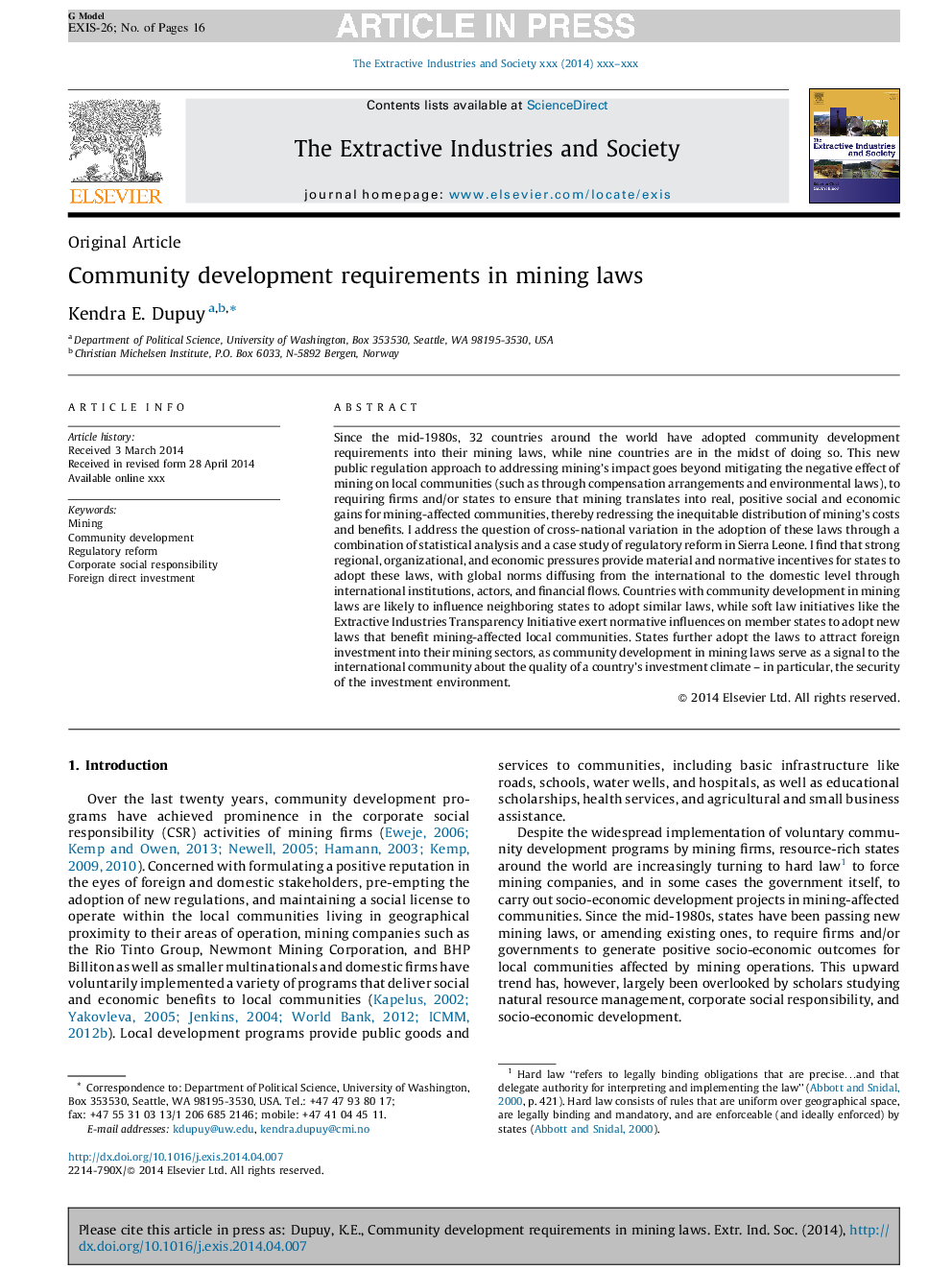| کد مقاله | کد نشریه | سال انتشار | مقاله انگلیسی | نسخه تمام متن |
|---|---|---|---|---|
| 10502251 | 945263 | 2014 | 16 صفحه PDF | دانلود رایگان |
عنوان انگلیسی مقاله ISI
Community development requirements in mining laws
ترجمه فارسی عنوان
الزامات توسعه جامعه در قوانین معدن
دانلود مقاله + سفارش ترجمه
دانلود مقاله ISI انگلیسی
رایگان برای ایرانیان
کلمات کلیدی
معدن، توسعه جامعه، اصلاحات قانونی، مسئولیت اجتماعی شرکت، سرمایه گذاری مستقیم خارجی،
ترجمه چکیده
از اواسط دهه 1980، 32 کشور در سراسر جهان، الزامات توسعه اجتماعی را در قوانین معادن خود اتخاذ کرده اند، در حالی که نه کشور در حال انجام آن هستند. این رویه جدید تنظیم مقررات عمومی برای رسیدگی به معادن، فراتر از مقابله با تأثیر منفی معادن در جوامع محلی (از جمله از طریق تعهدات جبران و قوانین زیست محیطی)، به درخواست شرکت ها و / یا ایالت ها برای اطمینان از اینکه معادن به حقیقت، مثبت اجتماعی و اقتصادی دستاوردهای جوامع تحت تاثیر معادن، در نتیجه توزیع نامناسب هزینه ها و مزایای معدن را اصلاح می کند. من در مورد پذیرش این قوانین از طریق ترکیبی از تجزیه و تحلیل آماری و مطالعه موردی اصلاحات نظارتی در سیرالئون، مسئله تنوع بین المللی را مطرح می کنم. من متوجه شدم که فشارهای منطقه ای، سازمانی و اقتصادی، انگیزه های مادی و هنجاری برای دولت ها را برای اتخاذ این قوانین، با هنجارهای جهانی از بین المللی به سطح داخلی از طریق نهادهای بین المللی، بازیگران و جریان های مالی، فراهم می کند. کشورهای دارای توسعه اجتماعی در قوانین معادن احتمالا بر کشورهای همسایه تاثیر می گذارند تا قوانین مشابهی را اعمال کنند، در حالی که ابتکار عمل نرم افزاری مانند ابتکار شفافیت صنایع استخراجی، اعمال هنجاری را بر کشورهای عضو اعمال می کند تا قوانین جدیدی را که برای جوامع محلی تحت تاثیر معادن قرار دارند، اعمال کند. ایالات بیشتر قوانین را برای جذب سرمایه گذاری خارجی در بخش معادن خود اتخاذ می کند، زیرا توسعه جامعه در قوانین معدن به عنوان یک نشانه برای جامعه بین المللی در مورد کیفیت یک محیط سرمایه گذاری در کشور به ویژه امنیت محیط سرمایه گذاری خدمت می کند.
موضوعات مرتبط
علوم زیستی و بیوفناوری
علوم محیط زیست
مدیریت، نظارت، سیاست و حقوق
چکیده انگلیسی
Since the mid-1980s, 32 countries around the world have adopted community development requirements into their mining laws, while nine countries are in the midst of doing so. This new public regulation approach to addressing mining's impact goes beyond mitigating the negative effect of mining on local communities (such as through compensation arrangements and environmental laws), to requiring firms and/or states to ensure that mining translates into real, positive social and economic gains for mining-affected communities, thereby redressing the inequitable distribution of mining's costs and benefits. I address the question of cross-national variation in the adoption of these laws through a combination of statistical analysis and a case study of regulatory reform in Sierra Leone. I find that strong regional, organizational, and economic pressures provide material and normative incentives for states to adopt these laws, with global norms diffusing from the international to the domestic level through international institutions, actors, and financial flows. Countries with community development in mining laws are likely to influence neighboring states to adopt similar laws, while soft law initiatives like the Extractive Industries Transparency Initiative exert normative influences on member states to adopt new laws that benefit mining-affected local communities. States further adopt the laws to attract foreign investment into their mining sectors, as community development in mining laws serve as a signal to the international community about the quality of a country's investment climate - in particular, the security of the investment environment.
ناشر
Database: Elsevier - ScienceDirect (ساینس دایرکت)
Journal: The Extractive Industries and Society - Volume 1, Issue 2, November 2014, Pages 200-215
Journal: The Extractive Industries and Society - Volume 1, Issue 2, November 2014, Pages 200-215
نویسندگان
Kendra E. Dupuy,
